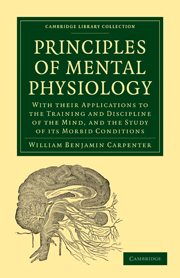 Principles of Mental Physiology
Principles of Mental Physiology Published online by Cambridge University Press: 29 August 2010
260. Although, as we have seen (§ § 189, 190), there are various forms of Emotional sensibility which are directly called- into activity by Sense-perceptions, yet those Emotional states of Mind which directly or indirectly determine a great part of our conduct, belong to the level of the Ideational consciousness; being, in fact, the result of the attachment of the feelings of pleasure and pain, and of other forms of emotional sensibility, to certain classes of ideas. Thus the Cerebrum and the Sensorium would seem jointly concerned in their production; for whilst the Cerebral hemispheres furnish the ideational part of the material, the Sensory ganglia not only give us the consciousness of their result, but invest that result with the peculiar feeling which renders it capable of actively influencing our conduct as a motive power. This we see clearly, when the Emotional state takes the form of a true desire; for when this is felt, even as regards the gratification of a bodily appetite, it involves the existence of an idea of the object of desire; but it is only when this idea is associated with the contemplation of enjoyment in the act to which it relates, or of discomfort in the abstinence from that act, that it becomes an impelling force towards the performance of it.—All the higher forms of Emotional consciousness may be decomposed (as it seems to the Writer) in a similar manner.
To save this book to your Kindle, first ensure no-reply@cambridge.org is added to your Approved Personal Document E-mail List under your Personal Document Settings on the Manage Your Content and Devices page of your Amazon account. Then enter the ‘name’ part of your Kindle email address below. Find out more about saving to your Kindle.
Note you can select to save to either the @free.kindle.com or @kindle.com variations. ‘@free.kindle.com’ emails are free but can only be saved to your device when it is connected to wi-fi. ‘@kindle.com’ emails can be delivered even when you are not connected to wi-fi, but note that service fees apply.
Find out more about the Kindle Personal Document Service.
To save content items to your account, please confirm that you agree to abide by our usage policies. If this is the first time you use this feature, you will be asked to authorise Cambridge Core to connect with your account. Find out more about saving content to Dropbox.
To save content items to your account, please confirm that you agree to abide by our usage policies. If this is the first time you use this feature, you will be asked to authorise Cambridge Core to connect with your account. Find out more about saving content to Google Drive.